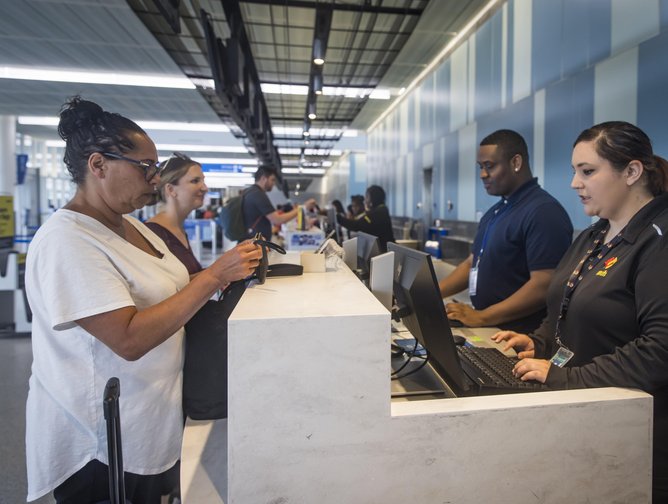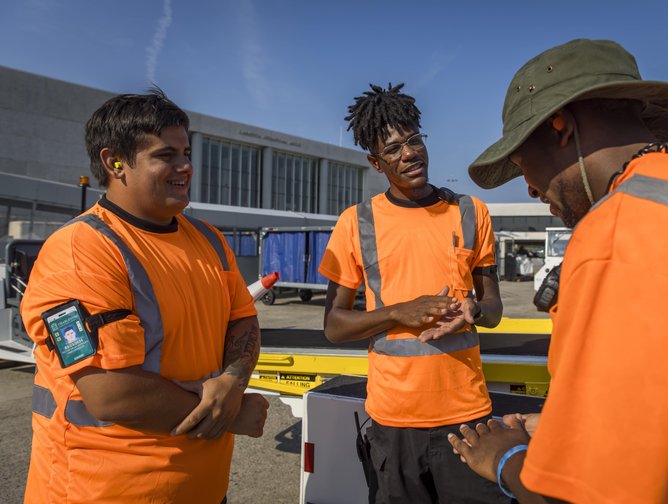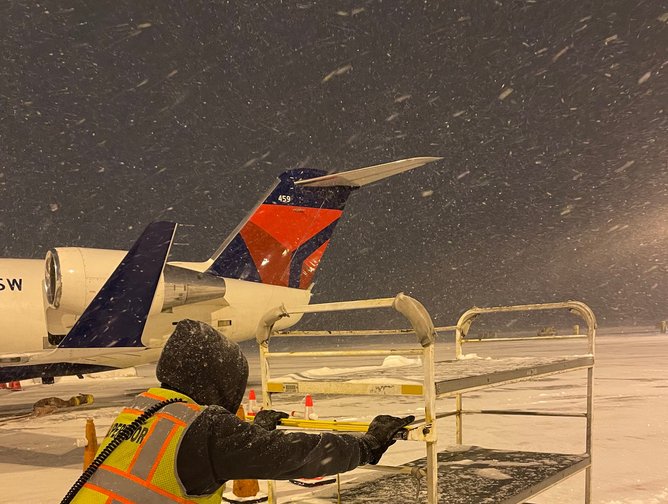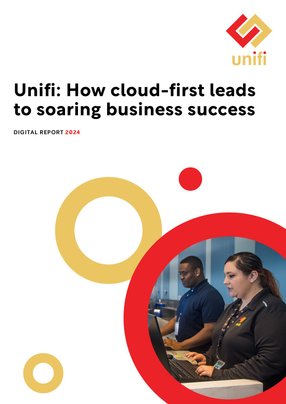Unifi: How cloud-first leads to soaring business success
Unifi is the largest ground handling and aviation services company in North America. Well-known and well-respected for its innovative and agile operations, Unifi’s vision is to be the most respected company by providing an exceptional experience getting aircraft and passengers to their destination safely.
As its Chief Information and Technology Officer, Sandeep Angra is responsible for Unifi’s technology infrastructure and digital operations across all functions of the business.
Unifi (previously known as Delta Global Services) went through a significant transition when Argenbright Holdings acquired a majority share of the company from Delta Air Lines in late 2018.
“Delta Global Services (DGS) became Unifi,” Angra explains. “DGS was a subsidiary of Delta Air Lines providing airport ground operation services not only to Delta, but other airline customers as well.”
Argenbright’s acquisition of DGS coincided with the emergence of the COVID-19 pandemic, presenting an enormous challenge. It was uncharted water for industries, like aviation, that are reliant on frontline workers. A team of leaders who were nimble problem solvers was needed, more than ever, for a successful transition.
With experience in consulting with KPMG, Bearing Point and PwC across multiple verticals, Angra explains that he was more than ready for the challenge of not only building something from scratch but doing so during such uncertain times The opportunity to transform Delta Global Services held a lot of professional appeal for Angra.
Fast forward to present day, and Unifi has experienced a considerable period of growth. Its headcount has almost doubled, and today the company has operations at more than 200 airports around the world.
“When Delta sold a majority of its stake in DGS to Argenbright Group, we were at roughly 15,000 employees, and today we have 28,000 employees,” Angra says. “DGS was in 130 airports, and today we operate at more than 200 airports. Not only that, but we’ve expanded our reach US to Canada and the UK, through our acquisition of Up & Away”
Unifi offers a full range of services required to run airport operations from traditional ground handling on the ramp to passenger services. “We provide full handling – all the way from towing the aircraft to cleaning it, fueling, de-icing, wheelchair assistance, gate agents, ground support equipment, baggage handling and more,” says Angra. “The company counts all major airlines as customers, and for some of them we actually handle more than 50% of their airport operations,” Angra describes. “We have also more than doubled the revenue since 2021. It’s been a remarkable journey.”
Building Unifi’s technology strategy
As per an agreement between Delta and TSA, Unifi was responsible for setting up its own IT infrastructure, architecture, core applications and other necessary IT components, as part of its separation from Delta Air Lines.
Faced with the task of building Unifi’s IT organisation from the ground up, forming a strong technology strategy was vital. As Angra explains, this strategy was focused on three pillars: what the organisation needed to do for its customers, for its passengers and for its employees.
When asked what the main challenges were with this task, Angra says he viewed it as less of a challenge and more of an opportunity.
“I had to really understand what our IT needs were, and consider what our strategy would look like, starting from zero,” he says. “That involved exploring what our roadmap would look like over three years, and then I had to set up the entire IT organisation, all within two years.”
Balancing budgetary constraints with a need to scale – a clear decision was made to focus on a cloud first strategy. The company adopted Microsoft Azure as the cloud-based backbone of its IT infrastructure, ensuring automation, scalability and reliability.
“We made the decision that we would have nothing on-prem and use modern architecture,” Angra explains. “Whether it's a database, whether it's an enterprise data lake or it is analytics. Whatever it is, we wanted to use the cloud and go with SaaS first.”
Scalability, Angra explains, was the driving factor in this decision, along with implementation time, security and innovation. Under his leadership Unifi’s IT infrastructure has been successfully scaled to support its growth, accommodating an increase in sales revenue to over US$1.3bn. “If we are launching Unifi at a new airport or a new city, it is easy to start up new operations and integrate when you’re using the cloud
“Without cloud, you have to set up your own product, custom development, setting up the servers. It would be a huge undertaking for a company like ours that is onboarding new contracts almost on a monthly – sometimes weekly – basis.Cloud gives us that scalability we need to thrive as a business.
“For example, we recently went in Calgary,” he illustrates. “If we didn't have modern infrastructure architecture applications, it would have taken at least six to nine months for us to set up the entire IT system there, but as a result of using the cloud we did it quickly and our operations went live within eight weeks of us winning the contract.”
Using AI and data modelling in Unifi’s operations
The issue of safety, particularly in the world of aviation, is critical. Unifi has partnered with Microsoft and Artis Consulting to develop a predictive and prescriptive aircraft and injury safety model.
“We have to focus on safety because keeping our people safe is paramount. It has a direct impact on our employees, on the airline and on passengers,” Angra explains.
With Artis Consulting and Microsoft, Unifi used number of Azure services including Azure AI, Azure Machine Learning and Power BI to develop this model to improve operations. The system provides risk values based on 30 variables and more than 500 data points, including staffing levels, tenure of leadership and employees, training, equipment quality and age, weather, and more. Since the predictive component's inception in August of 2022, it has had a consistent 94% accuracy rate.
“Now, our safety team can act proactively and look at all our ground handling contracts and determine the probability of any incident happening.It also tells us the measures that can be taken to reduce that risk. This data modelling system has been one of the most successful programmes Unifi has implemented, using Microsoft capabilities.”
Unifi first worked with Microsoft and Snowflake to design and develop its own enterprise data lake. “Building the data modelling programme would not have been possible if we didn't have a data lake,” says Angra.
“I’ve always known how critical data is – even from my early consulting days. So, when I was selecting all of our software, choosing modern data and analytics infrastructure and architecture was the top priority.”
How technology will change the airport experience
Angra predicts the future will see continuing emphasis on the digital experience for both passengers and employees at the airport. Unifi, he says, will focus particularly on three areas.
“We are going to first focus on a tactical perspective. How can we automate the majority of our processes using AI or RPA tools to bring more efficiency into our operations?”
The second area is the technology at airports. “Let's take an example of autonomous and semi-autonomous wheelchairs,” he says. “Can we relieve our employees of some of this manual work and bring that technology to the airport?”
“I have had a number of discussions with multiple executives at airlines. We need to work together to bring the latest technology to the airport,” says Angra. “I think the next generation of technology is already out there, but how we can bring that to the airport is very critical. That is what's going to differentiate between one airport ground handler and the other.”
As Angra explains, Unifi is well placed to address these technology trends going forward. “For us, productivity, customer experience, and having the right data, is extremely crucial. We are an early adopter of Microsoft 365 Copilot, are exploring an exciting generative AI partnership at select airports, and continuing to build on our tools and processes. We are able to do all this because we see the value in new technology.”
To solve problems around staffing, technology will play a crucial role. An early adopter of generative AI, Unifi was part of the early access programme for 365 Copilot thanks to its strong relationship with Microsoft.
“We are using gen AI to build new tools and capabilities which will reduce our overall training time,” Angra says. “We are building what we are calling a station manager buddy, where the station manager can go get answers to everything that they need to run their operations – it will make their day-to-day run smoother and eliminate some of the operational pains causing leaders to leave the business.
“We are in more than 200 airports and new people are regularly being onboarded. We have to train them, but two or three weeks of training isn't always sufficient. To solve that problem, I believe that generative AI is going to play a crucial role.
“I think if you look into the overall landscape, technology is changing very quickly, and I think that we are at the cusp of a next generation jump on the technology side, when it comes to AI and gen AI. I think these are going to change the way we look at technology, how we do things, how we code things and ultimately how we run our business.”
Make sure you check out the latest edition of Technology Magazine and also sign up to our global conference series - Tech & AI LIVE 2024
**************
Technology Magazine is a BizClik brand






